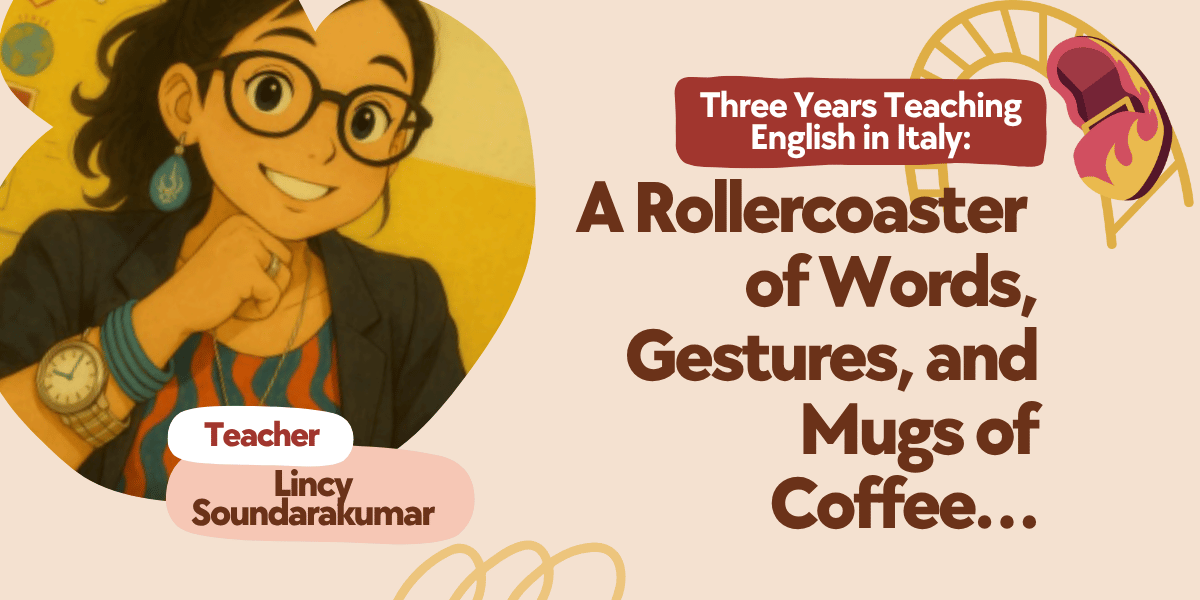After three years of teaching English across different corners of Italy, I’ve learned that mastering a language has less to do with grammar books and more to do with culture, coffee, and a good sense of humor.
If you had told me three years ago that I’d be standing in an Italian classroom, passionately debating the difference between “do” and “make” while my students stared at me like I had just asked them to solve quantum physics, I probably would have laughed.
And yet, here I am—three years into teaching English in Italy from the ages of 3 yrs – 60yrs , armed with an LIM board marker, a questionable grasp of Italian hand gestures, and an undying love for caffè macchiatone.

“Professional grammar wrangler, certified espresso enthusiast, and fluent in ‘Boh, forse sì, forse no.”
Lesson #1: English is Hard (and Italians Know It)
The English language is a strange and cruel beast, and no one realizes this faster than my Italian students.
-
- “Teacher, why is it ‘go home’ but not ‘go to home’?”
- “Why does ‘read’ sound different in the past tense?”
- “Why is ‘put’ the same in all forms but ‘sit’ changes?”
And my personal favorite:
“Why is ‘comb’ spelled with a ‘b’ if you don’t pronounce it?”
Honestly, great questions.
My best response? “Because English wants to keep things interesting.”
Lesson #2: Italians Fear One Thing More Than Taxes—Speaking English
Italians are fearless when it comes to overtaking you on a narrow road at 120 km/h, but put them in a room and ask them to introduce themselves in English? Immediate panic.
There’s a widespread fear of making mistakes, especially among adult learners. I quickly learned that my job wasn’t just about teaching grammar—it was about convincing my students that mispronouncing sheet is not the end of the world.
To break the ice, I started making deliberate mistakes in Italian (which, let’s be honest, wasn’t hard—I make them naturally). Suddenly, my students felt braver. If their teacher could butch—uh, creatively interpret—Italian, then surely they could handle a little English.
Lesson #3: Italians Can Speak English… But Will Never Admit It
Here’s the thing: Italians can actually speak English—at least A2-B1 level, if not more. And yet, the moment you ask them, the answer is always:
“My English is not very good.”
This is usually followed by a full conversation in English, complete with correct verb tenses, decent pronunciation, and even an attempt at humor.
Me: “But… you just spoke in English?”
Them: “Yes, but my English is very terrible.”
At this point, I just nod and sip my coffee, knowing that no amount of reassurance will convince them otherwise.
Lesson #4: Italians Love Their C1 Certificates (Even If They’re B1 at Best)
Ah, the glorious moment when someone proudly announces:
“I have a C1 certificate!”
And then proceeds to struggle through a simple conversation.
Italy loves language certificates. You could have a B1 level in speaking, but as long as you’ve passed an exam that says “C1,” you will proudly wear it like a badge of honor.
Meanwhile, a native speaker without a Cambridge certificate? Suspicious.
Probably not even a real English speaker.
Lesson #5: If You’re Not from the UK, You Must Be Lying About Your English
One of my favorite moments as an English teacher in Italy is watching the absolute shock on my students’ faces when they find out I’m not from the UK.
-
- “But… you speak perfect English?”
- “Wait… English is an official language in India??”
- “You studied in English??”
Yes, dear students. A country of over a billion people, colonized by the British for 200 years, does, in fact, have millions of English speakers.
Italians love British English and assume that if you’re a native English speaker, you must be from England. When they meet someone who speaks perfect English but isn’t British, their whole worldview collapses.
Lesson #6: Direct Translations from Italian Will Destroy the English Language
Italian and English are very different languages, and yet, my students attempt to translate word for word—with no mercy.
Some of my personal favorites:
-
- “I have 10 years old.” (Instead of I am 10 years old.)
- “Can you open me the door?” (Instead of Can you open the door for me?)
- “I go to make a shower.” (Instead of I’m going to take a shower.)
- “I am agree.” (Instead of I agree.)
And the best one:
“I make a mistake?”
(Yes, you did. But it’s okay.)
At this point, I just smile, correct them, and move on—knowing that in their hearts, they are agree that English is a strange language.
Lesson #7: English Is Taught in Italian (And It’s Not Helping)
One of the greatest mysteries of the Italian education system: English is mostly taught… in Italian.
Primary school, secondary school, high school—most students spend years studying English grammar in Italian and then wonder why they can’t speak the language.
Me: “So, how did you learn English in school?”
Them: “Oh, we studied a lot of grammar.”
Me: “Did you speak in English?”
Them: “No, the teacher explained everything in Italian.”
I rest my case.
Lesson #8: Some Parents Want Their Three-Year-Olds to Speak Fluent English
I genuinely admire Italian parents’ dedication to their children’s education. Some of them are so committed that they enroll their toddlers in English classes before the poor kids can even say mamma properly.
I respect their enthusiasm, but let’s be real: the child does not want to speak in English. Or Italian, for that matter. The child just wants to eat cookies and take a nap.
Still, I applaud the effort—because one day, that child will be 20, sitting in an English class, and telling me:
“My English is not very good.”
Lesson #9: British vs. American English Will Start Fights
Nothing causes more controversy in an Italian classroom than asking if it’s “football” or “soccer.”
-
- Colour” vs. “Color”
- “Lorry” vs. “Truck”
- “Pants” vs. “Trousers” (which nearly caused an international crisis)
At this point, I just tell them to pick their favorite and run with it.
Lesson #10: Italians Are the Masters of “Maybe Yes, Maybe No”
- “Let’s meet at 7?”
- “Boh, forse sì, forse no.” (Maybe yes, maybe no.)
- “Is it going to rain tomorrow?”
- “Mah, può darsi.” (It could be.)
Three years in, I have fully embraced the Italian art of ambiguity.
Do I know what I’m doing next week? Boh.
Will I ever understand the subjunctive in Italian? Mah.
Final Thoughts: Teaching in Italy is a Wild, Hilarious, Beautiful Ride
Between the grammar struggles, cultural mix-ups, and caffeine-fueled lessons, these years have been nothing short of an adventure.
If you’re thinking about teaching English in Italy, prepare yourself for the chaos, the laughs, and the occasional existential crisis over prepositions.
But trust me—it’s absolutely worth it.
Now, excuse me while I go correct another essay that ends with:
“In conclusion, Italy is very good.”


